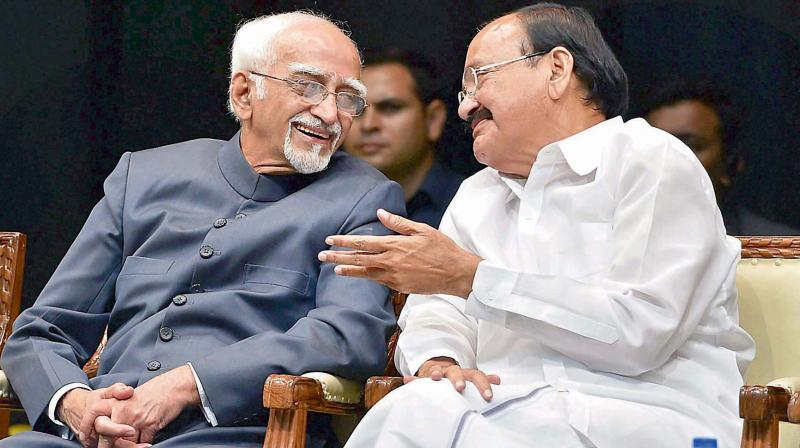Science, secularism and religions Navigating a curved space
To critique from a position of authority is never easy and never too late.

Chennai: The speeches in Parliament by political leaders to mark the 75th anniversary of the ‘Quit India Movement’, by sheer coincidence of dates, ran parallel to couple of brilliant speeches by the outgoing Vice-President, Dr M. Hamid Ansari (he demitted office on Aug 10). His deeply reflective and passionately statesman-like orations, a la late President and Philosopher Dr Sarvepalli Radhakrishnan, have unwittingly shaped a triangular cogitation on the eve of India’s 70th Independence Day.
While Dr Hamid Ansari’s farewell speech in the Upper House was widely reported in the media, his address at the 25th annual convocation of the National Law School of India University in Bengaluru on August 6, seems even more significant as he grappled with a range of issues, candidly and objectively, facing Indian democracy now. To critique from a position of authority is never easy and never too late. That hint seemed underwritten as he discussed key issues like secularism.
With technology revolutionising producer-consumers relationships, and as virtual reality dominates air waves, roles of intellectually-inclined political leaders, or that of the scholar-diplomat or the intellectual-bureaucrat have seen a steady erosion in public space. Political leaders today directly ‘tweet’ to their constituencies, each time in just 140 characters! Despite these new realities, revisiting issues raised by well-meaning thought-leaders is like invoking a catalyst to the vital growth and health of any society.
The wider sinking feeling about secular space with the concomitant decline of the relatively progressive, liberal and left-of-centre socio-political perspectives could be nonchalantly passed over as a mere tautology of our post-Truth times. But they have real consequences for public policy, when matters of religious and cultural beliefs are sought to be emotively merged with the entire public sphere in the quest for identity politics.
A brief flashback to the mid-1980s’ may be in order here. As students of Philosophy at the University of Rajasthan in Jaipur, our late professor and distinguished Philosopher, Daya Krishna had set apart one day in a week for 'creative philosophising', a seminar that was inter-departmental and where any issue could be raised and discussed. On one such occasion, discussing the connected problems of history, secularism and the Hindu-Muslim question, Dayaji in the course of the interaction, in his inimitable ever-smiling way, brushing aside all ideological ‘isms’ for a while, came up with a simple, disarming poser: “How many of you have a Muslim friend or eaten in a Muslim’s house?”
Such was Dayaji’s charming style of posing pointed, philosophical questions in seemingly ordinary language, engaging with issues of secularism, comparative religions and a cosmopolitan outlook, influenced by the best of knowledge traditions of the East and West. Frankly, even if some of us had Muslim friends, none in the seminar hall then could spontaneously say ‘yes’. At best, some of us sheepishly grinned at Dayaji, sensing the depth of his poser in the lives of countless ordinary Indian people. Only much later, when ‘Babri Masjid’ in Ayodhya was pulled down in December 1992, did we realise its true import that reading history singularly through the prism of ‘revenge’ was so myopic.
Significantly, Dr Hamid Ansari in his Bengaluru talk very nearly alluded to that approach, though choosing his words differently. The Indian Constitution has undoubtedly guaranteed equal rights to all sections of the people of the Republic. But the real issue is about ‘Secularism in practice’.
Observing that “experience shows that secularism has become a site for political and legal contestation,” the out-going vice-president insightfully said: “The ‘way of life’ argument, used in philosophical texts and some judicial pronouncements, does not help the process of identifying common principles of equity in a multi-religious society, in which religious majority is not synonymous with totality of the citizen body.”
“Since a wall of separation is not possible under Indian conditions, the challenge is to develop and implement a formula for equidistance and minimum involvement. For this purpose, principles of faith need to be segregated from contours of culture, since a conflation of the two obfuscates the boundaries of both and creates space to equivocalness,” Hamid Ansari explained, quoting from a research article on a review of Indian Supreme Court Judgments on ‘Secularism and Justice’.
If pluralism and secularism is to be promoted more substantially, he argued that it was not just ‘tolerance’ of other people’s faiths by the majority community, but it “must be coupled with understanding and acceptance”. Then the ‘fraternal’ spirit gets a better chance to prevail in social relations, promoting harmony and understanding, despite deeper conceptual, at times disguised as theological, and economic differences.
“The challenge is to look beyond the stereotypes and preconceptions that prevent us from accepting others,” he says, adding, “This makes continuous dialogue unavoidable”. And ‘citizenship’ and the responsibilities it entail is a core value that enhances this process.
The other strand to this complex issue, though not discussed by Mr. Hamid Ansari in these lectures, is whether a scientific temper among the people is conducive to promoting secularism. The spirit and method of science, which the great Philosopher of Science, late Dr Karl Popper said, moves ahead through ‘conjectures and refutations’. It takes ‘falsifiability’ as the criterion of science, and not just ‘verifiability’. Later Philosophers of Science, even radicalised our views of science and questioned its unity of method.
Nonetheless, to use the cultural history of science to debunk universal notions like ‘scientific bent of mind’ as a bulwark against superstitions and anachronistic beliefs that go in the name of organised religions, would be to throw out the baby with the bathwater.
Suspension of ‘ultimate truth claims’ about any belief system is still the hallmark of a scientific approach to problems of modern society, which is not antithetical to religions and which also helps to widen the secular space. To forget this inter-relationship between science and secularism would be like trying to draw a straight line in a curved space!

